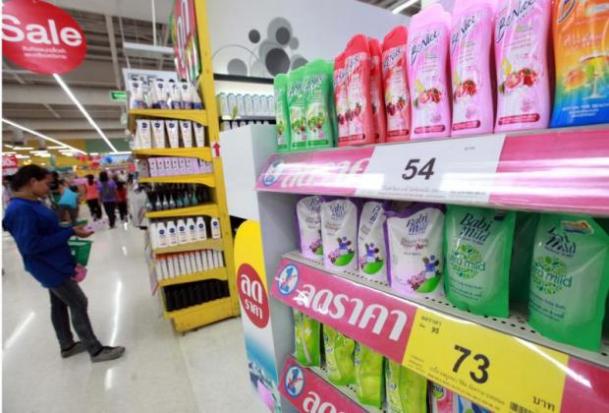Thailand: Fast-moving consumer goods see sluggish growth
The sales of fast-moving consumer goods (FMCG) grew by just 1% in the first half, the lowest rate in the past decade, says market research firm Kantar Worldpanel Thailand.
The consumable products in the category cover those which are sold quickly and are inexpensive, including non-durable goods such as soft drinks and processed foods.
The company’s new business development director, Aitsanart Wuthithanakul, said the growth of Thai FMCG sales has been sluggish this year because of the slow economic recovery, weak commodity prices and lower farm income affected by last year’s drought crisis.
“Moreover, while the government is trying to boost domestic consumption, household debt remains a strong barrier,” Mr Aitsanart said.
Household debt in Thailand is 80%, much higher than the 40-60% range reported in Taiwan, Indonesia and Singapore.
But the research house expects the situation to improve as the debt burden from the first-car buyer scheme eases. The five-year ownership lock-up for cars bought under the scheme began expiring late last year, resulting in more spending.
Mr Aitsanart said the hardship economy had caused people to be cautious in spending.
“They buy lower volume from fewer categories, shopping less often and paying less,” he said. “They choose to buy necessary products, forgoing unnecessary ones.
“Consumer behaviour has changed. Urban households shop less often but can spend more per trip, while rural households shop more frequency with smaller budgets each time. The latter, therefore, prefer buying smaller product packages.”
The constraints on household spending have affected several grocery product categories.
Sales in three major product categories — household goods, personal care, and food and drinks — dropped significantly in the first half.
But sales of some ingredients and raw materials such as rice and coconut milk rose, suggesting that many consumers have cut their dining-out budgets and are cooking at home instead. In-store promotions are also luring in more shoppers.
The survey found that shoppers in the first half spent the most at traditional trade channels, though the percentage of shopping via this channel gradually declined as consumers shifted to shopping at hypermarkets, convenience stores and online channels.
“Online shopping remains small but is accelerating,” Mr Aitsanart said. “It has huge potential as a future growth driver.”
Sales via online channels increased to 3.89 billion baht in the first half, up from 67 million in 2012.
Mr Aitsanart said 75% of online shopping is for personal care products.
Some 10% of Thai households are forecast to shop via online channels this year, up from 7.3% in 2016.
South Korea is currently the global leader in online shopping, thanks to urbanisation, free delivery and a high smartphone penetration rate, among other factors.
Source: http://www.bangkokpost.com/business/news/1315955/fast-moving-consumer-goods-see-sluggish-growth


 English
English




